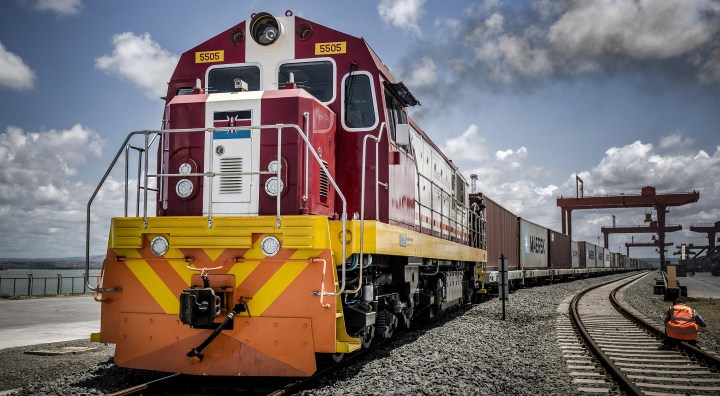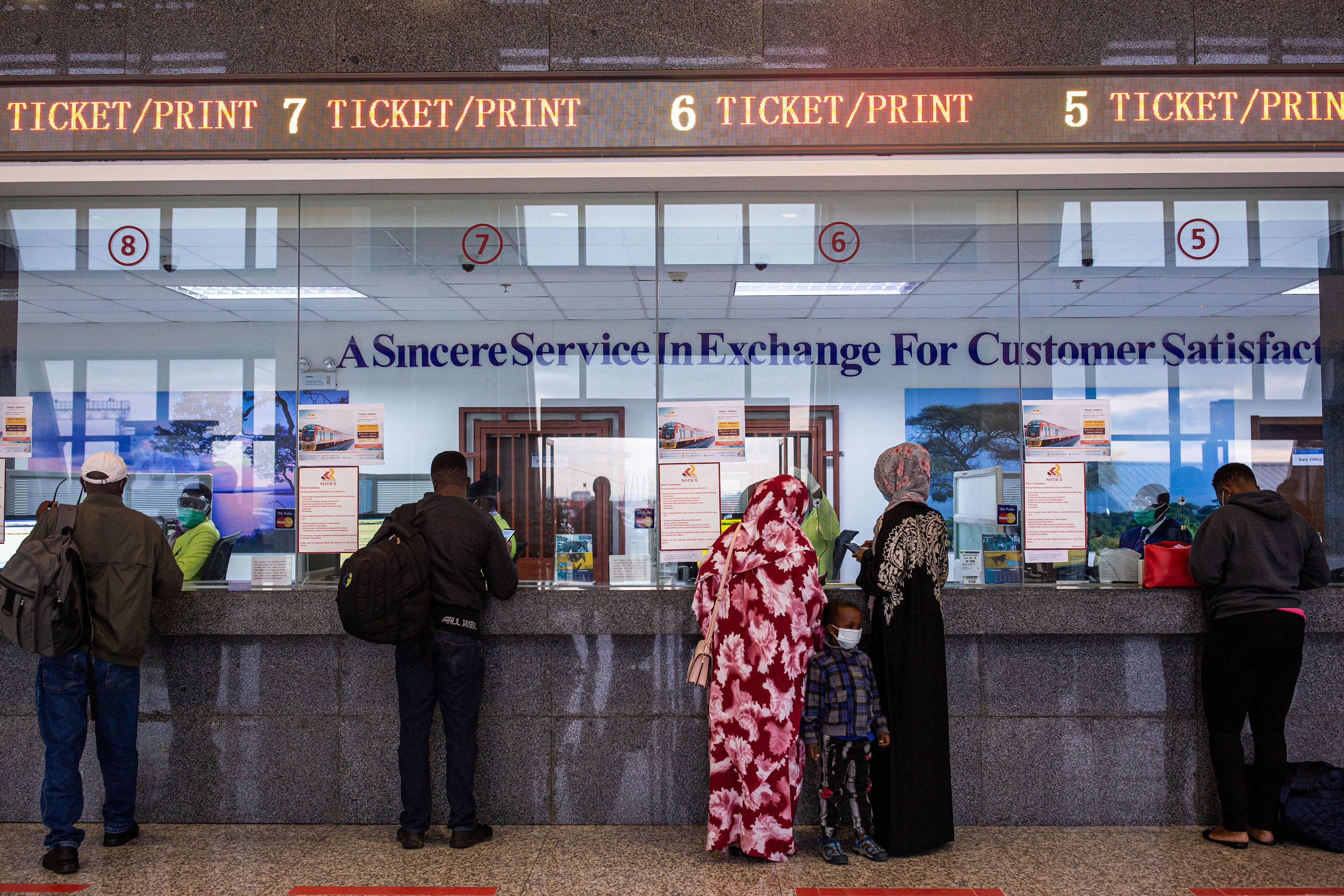AFRICA UNSCRAMBLED OP-ED
Shackled by debt and geopolitics, Africa struggles to join the global recovery

The IMF considers almost half of African countries to be in debt distress or at high risk of distress. What is especially concerning is that the largest economies, those most critical to driving regional growth, are in trouble.
Kenya’s Standard Gauge Railway from Mombasa to Naivasha, built by the China Road and Bridge Corporation, was supposed to be a showpiece of China’s grand global infrastructure project, the Belt and Road Initiative launched by Xi Jinping in 2013.
Built with a loan of $3.6-billion from the Exim Bank of China, the railway was meant to stimulate trade and investment and ultimately link up with the countries of the interior – Uganda, Rwanda, South Sudan and the Democratic Republic of Congo.
But it never generated the promised returns and now Kenya lacks the financing to take the rail up to the Ugandan border. Instead, it has become a symbol of the frustrations of indebtedness inherited by William Ruto’s government from his predecessor Uhuru Kenyatta.
Kenya, one of the most dynamic economies in the region which has racked up a healthy trade surplus with its neighbours, has had to delay salary payments to civil servants as it juggles the needs of its people against repayments of the Chinese debt that now consumes a hefty portion of the country’s budget.
Kenya is not alone. The spectre of chronic indebtedness is haunting Africa, immobilising economies and limiting access to the new capital and investment desperately needed to fund the continent’s development and growth.
The economic pain is affecting politically fragile countries. While it was not the direct cause, Sudan, which is indebted to China to the tune of at least $5-billion, experienced inflation in the region of 650% during 2022 before collapsing into civil war in April this year.
Read more in Daily Maverick: Will Emmerson Mnangagwa walk the talk and make Zimbabwe great again?
The IMF considers almost half of African countries to be in debt distress or at high risk of distress. What is especially concerning is that the largest economies, those most critical to driving regional growth, are in trouble.
Nigeria is paying about 97% of its revenue each month just to service its debt, while Egypt has quadrupled its external debt during the past decade with little return from its infrastructure investments.
Harvard economist Ken Rogoff told the Associated Press: “In a lot of the world, the clock has hit midnight.”
Abebe Selassie, the head of the IMF’s Africa department, has called for a new deal for restructuring sovereign debt. “We need to be sure that resources are going to support countries rather than being used to service unsustainable debts,” he said.
But despite some critical IMF bailouts – Ghana just received a $3-billion extended credit facility with an immediate disbursement of about $600-million – there is little sign of the international cavalry coming to the rescue.
During the last debt crisis, non-Chinese debtors cancelled $130-billion of debt in 2005 for dozens of low-income countries in the so-called Gleneagles Agreement.
Read more in Daily Maverick: Welcome to the new New World Order — don’t put all your BRICS in one basket
Selassie, among others, has called for a new Gleneagles moment given the damage that has been wrought on Africa’s vulnerable economies by Covid-19, Russia’s invasion of Ukraine, inflation and sky-high interest rates set by the central bankers in the developed world.
But the prospects for an all-encompassing deal are complicated by China’s emergence as a major creditor and the deepening geopolitical divide between the West and China.

Passengers at the ticket office at the Nairobi Standard Gauge Railway Terminus in Nairobi on 18 August 2020. The railway, funded, built and operated by Chinese agencies, started running between Kenya’s port city of Mombasa to the capital, Nairobi, in 2017. (Photo: Patrick Meinhardt / Bloomberg via Getty Images)
China at first participated, for the first time, in the G20 debt service suspension initiative in 2020, but further cooperation on restructuring was stalled by mutual suspicion.
This is reflected in the ongoing impasse in Zambia, which defaulted in 2020 and owes Chinese entities more than $6.6-billion.
China is unwilling to take the hit unless all creditors agree to take the same haircut, but bond holders and Western creditors are concerned about the lack of transparency in the Chinese loans and the evidence suggests that the loans were inflated to accommodate kickbacks for government officials and intermediaries.
In Kenya the government has toyed with the idea of declaring the debt odious, believing that one-quarter of the loans funded corruption.
Unless there is relief soon, the continent could get left further behind, reduced to the permanent status of, at best, an exporter of raw materials.
But the notion espoused by some in Washington, such as former national security adviser John Bolton, that this was all part of a nefarious plot by China to trap developing countries into surrendering their natural resources, does not hold water.
Michael Pettis, professor of finance at Peking University’s Guanghua School of Management, believes it is largely incorrect, and unfair, to identify China’s lending and its role in the restructuring process as “predatory”.
“While Chinese development lending expanded very quickly, the country’s lenders were inexperienced, ignorant of the risks, and overconfident in their analytical capacities during a time in which soaring commodity prices made developing borrowers seem better credit risks. China simply made all the mistakes that every country has made when it first ‘goes out’.”
What that means is that China, having learnt its lesson, is much more circumspect about its lending. Brad Setser of the Council on Foreign Relations believes that China’s net flows to Africa have turned negative – there is more money going on repayments than coming in as new loans.
Darker narrative
One thing is clear: the African rising narrative has been replaced by a much darker one in which, unless there is relief soon, the continent could get left further behind, reduced to the permanent status of, at best, an exporter of raw materials.
There are some early signs that the geopolitical stalemate could be broken. US Secretary of State Antony Blinken’s visit to China later this month could be an opportunity to search for common ground on the debt issue, which involves Asian and Latin American countries as well. It is one item where cooperation is necessary but need not be the source of superpower contestation.
Going forward, this whole crisis is about more than debt relief. African voices need to be about how to improve governance, how to shield the most vulnerable from the shocks of the global economy, how to unlock capital for growth and how to build manufacturing by connecting African economies to the global value chains.
Perhaps there are even ways in which African countries can benefit from the rapidly shifting geopolitics.
Olaf Scholz, the German chancellor, believes that if the West de-risks its value chains from China this could be “a path to generate economic development for the Global South”.
Moving even a small slice of manufacturing to Africa could be a game changer. DM
Phillip Van Niekerk is the editor of Africa Unscrambled, a newsletter covering the continent in a way you won’t read anywhere else. Get unscrambled by signing up right here.




















 Become an Insider
Become an Insider
“Michael Pettis, professor of finance at Peking University’s Guanghua School of Management, believes it is largely incorrect, and unfair”
Well of course he’d say that wouldn’t he! Peking University’s in freaking Beijing, home of the New Mao.
But I have to ask – didn’t anybody in Nairobi hear about the problems with the Chinese-funded TanZam railway line?!